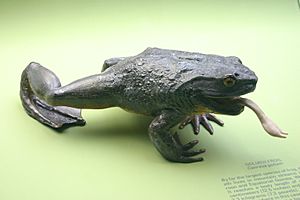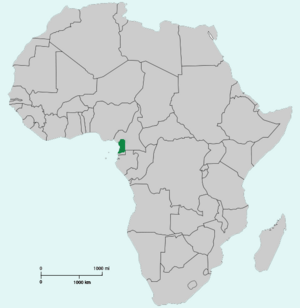Goliath frog facts for kids
Quick facts for kids Goliath frog |
|
|---|---|
 |
|
| Conservation status | |
| Scientific classification |
|
| Kingdom: | Animalia |
| Phylum: | Chordata |
| Class: | Amphibia |
| Order: | Anura |
| Family: | Conrauidae |
| Genus: | Conraua |
| Species: |
C. goliath
|
| Binomial name | |
| Conraua goliath |
|
 |
|
| Script error: The function "autoWithCaption" does not exist. | |
Script error: No such module "Check for conflicting parameters".
The goliath frog or giant slippery frog (Conraua goliath) is the biggest frog on Earth! Imagine a frog as big as a small dog. It can grow up to 32 centimetres (about 13 inches) long. This means it's longer than a standard ruler! It can also weigh as much as 3.25 kilograms (over 7 pounds). That's heavier than a newborn baby!
These amazing frogs live in the forests of western Africa. They prefer to live near fast-flowing rivers and streams. Their huge size helps them survive in their natural home.
Amazing Parenting Habits
In 2019, scientists made an exciting discovery about goliath frogs. They learned that these giant frogs do something very special. They actually dig their own pools to lay their eggs in! This is very unusual for frogs.
Scientists believe it's the male frog who does all the hard work. They move sand, small pieces of plants, and even stones. Some of these stones are almost as big as the frogs themselves! They use these materials to build strong walls around the pools. These walls help protect the eggs and young tadpoles.
Scientists also noticed something interesting about the tadpoles. Not all the tadpoles in one pool were the same size. This made scientists think that the frogs might lay eggs in the same pool more than once. It's like they're reusing their special nurseries!
Protecting Their Young
Adult goliath frogs don't just build pools; they also protect their babies. Scientists saw adult frogs staying near the pools at night. They were guarding the tadpoles! Their job was to scare away bigger animals that wanted to eat the young.
This protective behavior might be why the goliath frog is so big. Bigger frogs can move larger rocks to build stronger pools. They can also scare away bigger predators. This helps more of their young survive. It shows how important their size is for their family life.
Images for kids
-
A preserved goliath frog at the Harvard Museum of Natural History.
See also
 Want to learn more? Check out the article in Spanish: Rana goliat para niños
Want to learn more? Check out the article in Spanish: Rana goliat para niños
 | Tommie Smith |
 | Simone Manuel |
 | Shani Davis |
 | Simone Biles |
 | Alice Coachman |



